- Home
- John Harris
Corporal Cotton's Little War Page 2
Corporal Cotton's Little War Read online
Page 2
Kennard nodded his acknowledgement of Cotton. Ponsonby’s expression seemed to indicate that Cotton probably smelled.
Patullo paused, moving a few papers about on the table in front of him. Since the incident with the shopkeeper in Heraklion, he had taken a great delight in getting Cotton to one side so he could toss phrases at him, testing him, teasing him, quoting a lot of ancient Greek poets Cotton had never heard of and saying he reminded him of Homer or Aeschylus. If Patullo hadn’t been so obviously normal – his escapades with the ladies of Alexandria had become notorious even with the lower deck – Cotton might have thought he was making advances to him. As it was, he had long since realised it was nothing but Patullo’s weird sense of humour at work.
He stood now, stiff and motionless, well aware that there was something in the wind. There’d been something in the wind ever since Caernarvon had arrived in Suda Bay, and he was just waiting to see how it concerned him.
‘Loukia.’ Patullo sorted out his papers and raised his eyes again. ‘A motor launch, Corporal,’ he explained. ‘Indeed, a damned fast motor launch. What you’d really call a high-speed motor boat.’
‘I see, sir,’ Cotton said.
He was giving nothing away. In Caernarvon there were a lot of people who considered that Cotton was not particularly bright. In fact, he was brighter than he seemed and he was a sound Royal Marine because the discipline and tradition of the corps had been well instilled into him and he believed in good order and had no objection to being told what to do. He was also an old soldier, and had an old soldier’s sharp awareness of ‘buzzes’, of things that went bump in the night, and duties that might be unpleasant and were best avoided, at one with all those sly, wily men who knew exactly which side their bread was buttered, ancient in the service and all-wise when it came to dodging church parades. Whatever it was that was in the wind, it smelled to Cotton as though it was going to concern him very deeply.
It was Ponsonby who spoke next, taking over from Patullo.
‘There were three of these boats originally,’ he said in a voice that sounded like a file rasping on the edge of an anvil. ‘Claudia, Loukia and Irene. They were a class of boat developed for rich people to enjoy themselves in, and they belonged to the Greek millionaire, Spiro Panyioti, who used them for fishing and that sort of thing. He gave them to us after using them for evacuating his family and personal fortune from the mainland.’
Cotton waited. They seemed, he thought, to be going halfway round the bloody world to reach the point.
‘We mounted 303s on them,’ Kennard joined in. ‘Only Lewis guns, unfortunately, which aren’t so hot, but we did get some captured Italian 20mm cannons from the Greeks, and we put one on the stem of each against aircraft. Unfortunately we lost Irene a few days ago. She disputed the right of way with the destroyer Wryneck, and not unnaturally came off worst. Now, in what seems to have been the last flicker of life in the Italian navy, Loukia seems to have been caught by motoscafi anti-sommergibili – fast motor launches to you, Cotton – and has been wrecked, leaving us only Claudia.’
Patullo pushed a sheaf of flimsies across the table. ‘Better read the messages, Cotton,’ he said helpfully. ‘They can tell you as much as we can.’
It wasn’t difficult because there weren’t many. ‘Blenheim bomber landed in sea…’ Cotton saw. ‘Investigating survivors.’ They told a tragic little story in as few words as possible but Cotton, who’d been involved in picking up a few survivors since the war in the Mediterranean had come to life, could well imagine the drama that had gone on in the cramped forecastle of the little vessel, with anxious seamen knowing only a little of medicine and surgery crouched over a soaked and wounded airman gasping out his life.
There was a second or two of silence; then Ponsonby went on. ‘They were taken off course by the ditching,’ he said, ‘and the Italians got them. It seemed that was the end of it, but then a Blenheim of 113 Squadron from Nyamata, in Greece, reported seeing a boat ashore on the island of Aeos and it seemed as if it might be Loukia. We got them to fly another recce over the place, and, sure enough, it is Loukia She’s beached there and seems to be wrecked. But there were several men standing by her on the sand, waving, so it seems some of the crew survived. We have to find them.’
‘Why, sir?’ Cotton had never before known the services to be so bloody keen to pick up odds and sods who got left behind.
Ponsonby looked at Kennard, who shrugged; then he lit a cigarette, slowly, carefully, as though he were wondering how much to say. ‘You know the situation on the mainland, Corporal?’
Cotton knew it only too well. The British army, which had been put smartly on shore in March, looked very much now, in April, as though it would have to be taken smartly off again.
Kennard picked up a piece of paper. ‘On March 4th,’ he said, ‘at the Greek government’s request, we began to land an army. On April 6th, the Germans launched their attack in the Balkans. They have now reached Yugoslavian Macedonia and are approaching the Salonika plain, and the Greeks west of there on the Albanian front are expected eventually to surrender. That would make our position untenable, and a withdrawal to a position round Mount Olympus has already been planned. It seems that when it starts it will continue to the coast.’
Cotton didn’t really need telling. He was no strategist, but the road outside was already dusty from the troops marching from the landing stages where the transports were dumping them from the mainland. That spring of 1941, the Germans could count the divisions they had available in dozens, the British on one hand, and Corporal Cotton had never expected the soldiers to stay long in Greece. Every man in the fleet could have told them what the result would be, even as they’d disembarked them at the Piraeus.
‘See you later,’ they’d said. ‘At the evacuation.’
Ponsonby tapped the ash off his cigarette and spoke again. ‘That’s old news now, of course. What you probably don’t know is that months before the decision to send British troops to Greece was finally taken, Admiral Cunningham set up a plan to bring them all out again.’
‘An eminently sensible precaution in view of our track record up to now,’ Kennard said.
There was a clear atmosphere of tension and worry, and Ponsonby sniffed. He looked like a man who believed in last stands – so long as he personally didn’t have to make them.
‘As a result of all this’ – he was looking out of one eye at Kennard – ‘arrangements were made to hedge our bets in case of defeat. Loukia was carrying a consignment of weapons for the Greeks.’
‘Quite simply,’ Kennard said bluntly, ‘we were intending to stir up trouble for the Germans after we’d left. Loukia was sent off under the command of Lieutenant-Commander Richard Samways, an experienced small-boat officer, and her bilges were full of rifles, grenades and other assorted weapons. It was hoped they’d be instrumental in starting a resistance movement.’
Ponsonby took off his spectacles and started to polish them. ‘We think, from the reports we’ve received, that this bay she’s in–’ he glanced at the map – ‘Xiloparissia Bay – is a lost sort of place, well covered with trees at one side, and steep and almost inaccessible at the other. It may be that those rifles are still there. We have to make some attempt to recover them.’
By this time Cotton had begun to suspect the route the discussion was taking and he didn’t particularly like it. He noticed that Patullo and Ponsonby were both watching him carefully.
Kennard continued. ‘Since the navy’s hard-pressed and its launches have to be used for coastal escort work, when we decided to send the guns to Antipalia it was decided that Loukia was the only boat we could spare. At least she had a speed of thirty-five to forty knots.’ He pushed several photographs across. They showed a boat, apparently intact apart from a fallen mast, lying on the edge of a beach half-hidden by trees.
‘That’s Loukia,’ he said.
Cotton studied the men beyond the table. Patullo stared at the papers in front of him. He seemed faintl
y embarrassed. Kennard looked at Ponsonby.
‘I think he should know,’ he said.
Ponsonby stubbed out his cigarette and looked up. ‘Loukia, Corporal,’ he said, ‘was also carrying twenty thousand pounds in coinage. Maria theresas and napoleons and silver American dollars. Though those coins are no longer legal tender, for your information they are still valuable and most governments manage to have a few under the counter for operations when paper money ceases to have much value. They were also to be used for Greek resistance.’
Cotton’s face didn’t change. ‘Very nice, sir,’ he said again.
‘We don’t want that money to fall into the hands of the Germans,’ Ponsonby pointed out. ‘We also want the rifles.’
‘And Loukia,’ Kennard added.
Cotton frowned. They didn’t want so bloody much, he decided. ‘I thought that’s how it was, sir,’ he said.
Ponsonby gave him a sharp, suspicious look as if Cotton were trying to be clever. ‘We expect the Germans to try something here before long,’ he went on. ‘They’re not likely to be happy with an aircraft carrier the size of Crete off their south-eastern flank.’
No, by Christ, Cotton thought, they weren’t. Crete had made a vast difference to the Royal Navy but it had proved a mixed blessing in the end, because the Stukas had already knocked the living daylight out of two cruisers and an aircraft carrier, and Cotton was under no delusions that worse was to come.
Ponsonby looked up again and Cotton decided he didn’t like him very much.
‘You’re Greek, Corporal,’ Ponsonby said.
Cotton jumped, and decided abruptly that he didn’t like Ponsonby at all.
‘Not me, sir,’ he said indignantly. To Cotton, Greece was as foreign as Tibet. He knew his mother received postcards occasionally at Christmas from Athens and that he had an Aunt Chrysoula and two cousins, Despina and Eleftheria, who, judging by the photographs, were a bit of all right in the manner of Maltese girls, but he’d never been to Athens to meet them and didn’t expect to go.
Ponsonby was staring at him suspiciously. ‘You speak Greek,’ he accused.
This was something Cotton couldn’t deny, though under the circumstances he’d have liked to.
‘A bit, sir,’ he admitted cautiously.
‘Your mother was Greek.’
‘Until she married my Old Man, sir. After that, she considered herself an Englishwoman.’
‘But your father was Greek, too, wasn’t he?’
‘My Old Man was English,’ Cotton said sharply. ‘His family went to London fifty-odd years ago.’
‘His name’s Cotonou.’
Cotton wondered where the hell Ponsonby had found out because he’d deliberately changed his name when he’d enlisted; he’d been called ‘dago’ and ‘wop’ too often in civvy street for him to want it to follow him into the service. He realised Patullo was the culprit and gave him an aggrieved look.
Ponsonby was staring at a sheet of paper in front of him and he lifted his head to peer accusingly at Cotton. ‘You know Greece?’ he asked.
‘No, sir, though I’ve got relatives there, I believe. I reckon they’re still there. They weren’t millionaires, sir.’
Kennard looked up. He was smiling as if he were trying to take the heat out of the interview. ‘One thing you are, without any doubt,’ he said. ‘And that’s a Royal Marine.’
‘Yes, sir.’ That, at least, was undeniable. In fact, Cotton had always thought it stuck out all over him in large lumps. Joeys were Joeys and couldn’t be anything else.
The commander smiled as if he were reading Cotton’s thoughts. ‘“’E sleeps in an ’ammick instead of a cot,”’ he quoted, ‘“an’ ’e drills with the deck on a slew. An’ ’e sweats like a Jolly – ’Er Majesty’s Jolly – soldier an’ sailor, too!” Kipling,’ he ended. ‘You know Kipling’s Marine, Corporal?’
‘Yes, sir,’ Cotton said stolidly, giving nothing away in the matter of encouragement.
There was a moment’s silence, then Ponsonby drew a deep breath and looked up at Cotton. ‘It’s absolutely essential that what Loukia was carrying is brought away, Corporal,’ he said.
Cotton was beginning to fight a rearguard action now. ‘Suppose it can’t, sir?’
‘From the reports we have, it can. In addition, we’d rather like to know what the Germans’ next move is to be and it’s just possible Loukia’s money might be used to help. Aeos is a large island not so far from the mainland.’
There was another silence then Kennard spoke again. ‘We shall be sending Loukia’s sister ship Claudia,’ he said. ‘She’ll carry a carpenter–boat builder – from the Merchant Navy, because he’s the only one spare – in case we can patch Loukia up. There’ll be an ERA to take a look at her engines, and a crew of eight under Lieutenant Shaw, of ML137. We have several volunteers already: two RASC men from military lighters, some sailors, and one airman who speaks German. They’re a mixed bag but we couldn’t just help ourselves where we fancied. They’ll be issued with Greek money and their orders will be to pick up Loukia’s survivors and the arms and money. If it’s possible, they will also effect repairs on Loukia, tow her off and bring her back, too, because we’re badly in need of boats. Since they may have to inspect her hull, there will be a diving suit on board. Do you know anything about diving, Corporal?’
‘No, sir.’
‘Well, it’s a shallow-water closed-circuit re-breather type and there’ll be a man aboard who can use it.’
Cotton knew what was coming next. ‘Who’s in charge of the show, sir?’ he asked.
Patullo gave a small embarrassed smile. ‘Me, Cotton. I was conscripted into offering my name.’
Cotton knew exactly what he meant: ‘Three volunteers. You, you and you!’
‘Now we need one more,’ Patullo went on. ‘Greek-speaking.’
‘Me, sir?’
Patullo smiled. ‘I thought of you at once, Cotton.’ Cotton decided he was about to volunteer for something without even opening his mouth. And volunteering was something an old Joey – or an old anything else, for that matter – just didn’t do. It could get you into trouble. A friend of his in the Royal Scots had volunteered for a driving course and had ended up as a cook in Singapore. All that seemed to be missing was a bed of nails and a couple of hair shirts.
‘We have a lot to do,’ Patullo explained, ‘and not much time to do it in. It was decided under the circumstances that more than one Greek speaker would be an advantage. That’s where you come in.’
With an effort, Cotton managed a slightly bitter smile.
‘I thought it might be, sir,’ he said.
Two
Unfortunately for Corporal Cotton, Lieutenant Patullo, Commander Kennard, and Mr George Ponsonby, of the Foreign Office, they were not the only people who had an eye on Aeos.
From Belgrade in Yugoslavia, Wehrmacht Field Marshal Wilhelm List, who was in command of the over-all operation for the subduing of the Balkans, had sent out instructions to General Johann-Helmuth Ritsicz, of the German 12th Army, who had set up his headquarters in Sofia, Bulgaria, a mere hundred-odd miles from the great Macedonian plain. Well placed for communications with the valleys of the Danube and the Struma, Sofia was a curious mixture of Thracian, Roman and Turkish civilisations and at that very moment, in a room near the Buzuk Dzămija Mosque, a certain Major Renatus von Boenigk Baldamus – until wounded in the invasion of France the previous year, part of the 346th Panzer Grenadiers – was just being informed of the part he was to play.
Ritsicz’s headquarters were in the Bălgarija Hotel near the Narodno Săbranie and, with the city already subdued, General Ritsicz was walking confidently up and down as he talked. His thick legs breeched with the red stripe of the General Staff, he stumped heavily backwards and forwards between the window and the door. Major Baldamus listened in silence; a smooth-faced man, young for his rank but intelligent, clear-headed and despite the air of insouciance he affected as part of his stock-in-trade – decisive when necessar
y. From where he sat, he could see the Russian Church of St Nicholas and, beyond the Narodno Săbranie, the towers of the Alexandar Nevski Cathedral. After his light-hearted fashion, he had come to the conclusion that they provided a much more impressive vista than General Ritsicz who had the heavy jowls of a man who liked his food. Son of a wealthy Ruhr manufacturer, Major Baldamus was never inclined to drop on one knee before his superiors, and, while he was shrewd enough to see the advantages Hitler had gained for Germany, he was not even a Nazi.
For the tenth time General Ritsicz turned by the window and faced him. ‘Your orders,’ he said, ‘which have come direct from Field Marshal List, are to land on Aeos and take possession of it. There must be no mistake, and nothing half-hearted about it. You will be in possession.’
You will advance to the right in threes, Major Baldamus thought cynically. You will keep your barrack room tidy. You will engage in a football match. You will capture London, shoot Churchill and take the King of England prisoner. All part of the scheme. The army never suggested that you might not. You will, it said, and that didn’t mean, you will have a go. It meant, quite simply what it said: You will.
But though Major Baldamus was under no illusions, he also had no personal doubts. ‘What opposition can we expect, sir?’ he asked politely.
Ritsicz stopped and turned to face him again. ‘None,’ he said. ‘There will be none. Intelligence states quite categorically that there is no organisation for opposition. There are no troops on the island, except perhaps a few in the capital in the north, attached for Customs duties and things like that. There may also be a few sailors attached for harbour service, but there are no naval ships in the harbour, and there are no aeroplanes.’

 China Seas
China Seas The Mercenaries
The Mercenaries Road To The Coast
Road To The Coast The Thirty Days War
The Thirty Days War The Old Trade of Killing
The Old Trade of Killing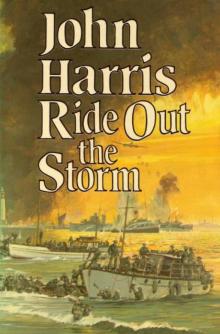 Ride Out The Storm
Ride Out The Storm Corporal Cotton's Little War
Corporal Cotton's Little War Fox from His Lair
Fox from His Lair Paint The Rainbow
Paint The Rainbow Flawed Banner
Flawed Banner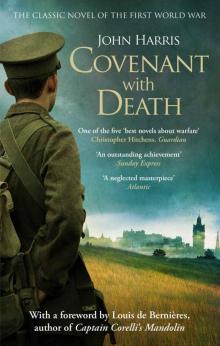 Covenant with Death
Covenant with Death So Far From God
So Far From God The Sea Shall Not Have Them
The Sea Shall Not Have Them The Cross of Lazzaro
The Cross of Lazzaro Smiling Willie and the Tiger
Smiling Willie and the Tiger Harkaway's Sixth Column
Harkaway's Sixth Column The Sleeping Mountain
The Sleeping Mountain The Claws of Mercy
The Claws of Mercy North Strike
North Strike Picture of Defeat
Picture of Defeat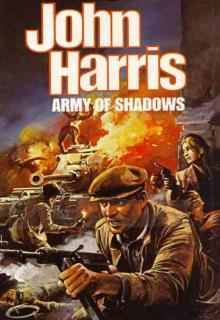 Army of Shadows
Army of Shadows Right of Reply
Right of Reply Getaway
Getaway The Lonely Voyage
The Lonely Voyage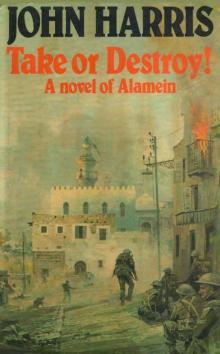 Take or Destroy!
Take or Destroy!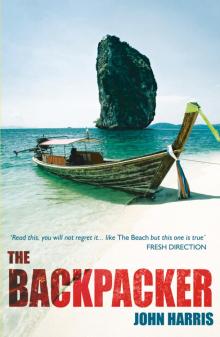 The Backpacker
The Backpacker A Funny Place to Hold a War
A Funny Place to Hold a War Swordpoint (2011)
Swordpoint (2011) A Kind of Courage
A Kind of Courage